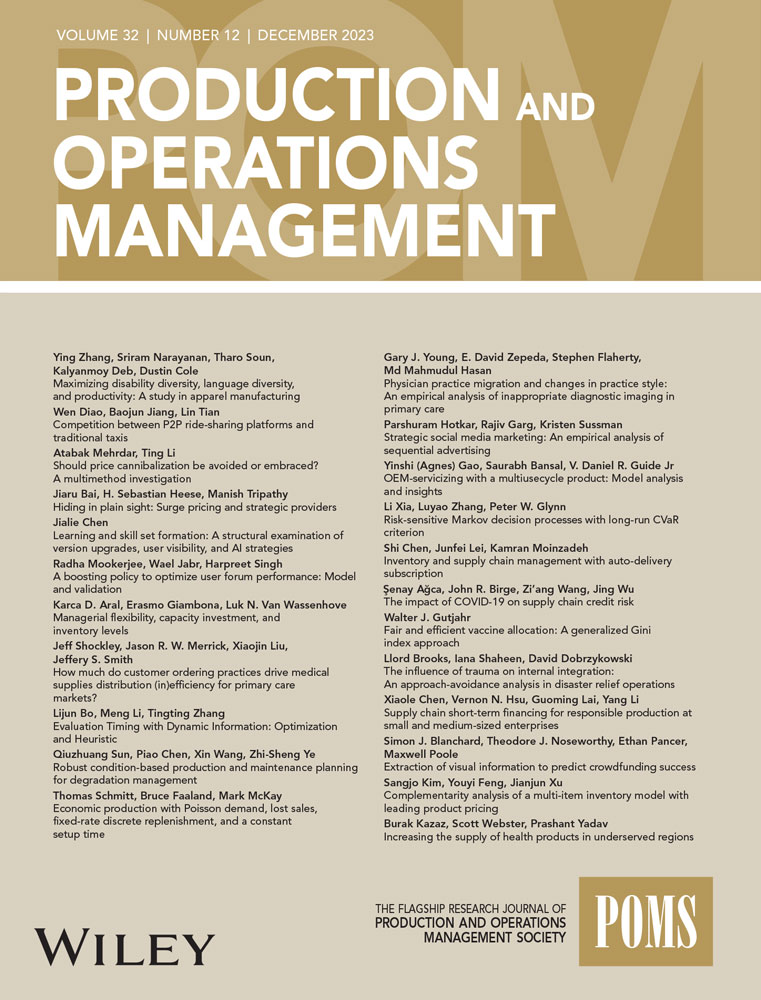EXPRESS: Revisiting Equity in Urban Operations Management 50 Years Later: What Do City Planners Have to Say?
IF 4.8
3区 管理学
Q1 ENGINEERING, MANUFACTURING
引用次数: 0
Abstract
The persistent inequities in American cities—long recognized and lived by black and Hispanic people and other minorities, the poor and working class, and others disadvantaged by urban systems—have been vaulted into the broader public consciousness over the past decade. Lessening entrenched urban inequalities is now at the top of the national policy agenda, suggesting a need and opportunity for more urban operations management. On what issues and how might this work occur? Operations management was deeply intertwined with urban planning in research and practice from the 1950s through the 1970s, at which point the fields diverged. To build a case for what perspectives and approaches a modern urban operations management agenda might employ to address inequity, I synthesize historical and contemporary planning theory with the debates among reflective operations scholars in the 1950s-1970s over work on cities. Modern operations scholars can look to planning, and especially to recent major shifts in its thinking on race and class, to address urban operations that disadvantage some city residents and overly advantage others. This urban operations agenda should be empirical, equity-oriented, and community-focused in order to best resonate with planners and the city residents they serve. In reengaging with planners to tackle the modern range of urban policy problems, operations analysts have a chance to contribute practical clarity on how cities work and can be made more livable for all residents.快讯50年后重新审视城市运营管理中的公平问题:城市规划者怎么说?
美国城市中长期存在的不平等现象一直为黑人、拉美裔美国人和其他少数族裔、穷人、工人阶级以及其他受城市制度影响的弱势群体所认识,并长期存在于他们的生活中。目前,减少根深蒂固的城市不平等现象已成为国家政策议程的重中之重,这表明有必要也有机会开展更多的城市运营管理工作。在哪些问题上以及如何开展这项工作?从 20 世纪 50 年代到 70 年代,运营管理与城市规划在研究和实践中一直紧密交织在一起,但从那时起,这两个领域就分道扬镳了。为了说明现代城市运营管理议程可以采用哪些视角和方法来解决不平等问题,我将历史和当代规划理论与 20 世纪 50 年代至 70 年代具有反思精神的运营学者对城市工作的争论进行了综合。现代运营学者可以借鉴规划理论,尤其是近期规划理论在种族和阶级问题上的重大转变,来解决城市运营中对某些城市居民不利而对另一些城市居民有利的问题。这种城市运营议程应该是实证的、以公平为导向的、以社区为中心的,这样才能最好地与规划师及其服务的城市居民产生共鸣。在与规划师重新合作解决一系列现代城市政策问题的过程中,运营分析师有机会就城市如何运作以及如何为所有居民创造更宜居的环境做出切实可行的澄清。
本文章由计算机程序翻译,如有差异,请以英文原文为准。
求助全文
约1分钟内获得全文
求助全文
来源期刊

Production and Operations Management
管理科学-工程:制造
CiteScore
7.50
自引率
16.00%
发文量
278
审稿时长
24 months
期刊介绍:
The mission of Production and Operations Management is to serve as the flagship research journal in operations management in manufacturing and services. The journal publishes scientific research into the problems, interest, and concerns of managers who manage product and process design, operations, and supply chains. It covers all topics in product and process design, operations, and supply chain management and welcomes papers using any research paradigm.
 求助内容:
求助内容: 应助结果提醒方式:
应助结果提醒方式:


